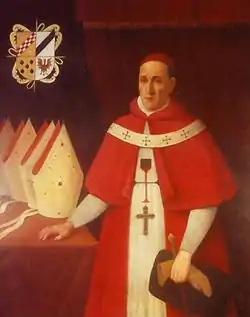Diego Morcillo Rubio de Auñón
Fray Diego Morcillo Rubio de Auñón, O.SS.T. (sometimes Diego Morcillo Rubio de Suñón de Robledo) (January 3, 1642, Villarrobledo, Albacete, Spain – 1730, Lima, Peru) was a Spanish bishop in Peru and twice viceroy of the colony, from August 15, 1716 to October 5, 1716 (interim) and from January 26, 1720 to May 14, 1724.

Biography
At a young age he entered the Calced branch of the Trinitarian Order in Toledo. He studied theology at the University of Alcalá. In Alcalá King Charles II named him preacher of the royal chamber. He also became examiner (calficador) for the Supreme Council of the Inquisition.
On November 21, 1701, he was named during the papacy of Pope Clement XI as Bishop of the Diocese of Nicaragua and consecrated in 1703 by Juan de Argüelles, Bishop of Panamá.[1] Continuing his ecclesiastical advancement, he was appointed by Pope Clement XI as bishop of La Paz, Bolivia on May 14, 1708, by Pope Clement XI as Archbishop of the Archdiocese of La Plata o Charcas on March 21, 1714, and finally by Pope Innocent XIII as archbishop of Lima on May 12, 1723.[1] While bishop, he was the principal consecrator of Juan de Necolalde, Bishop of Concepción (1716); José Luis Palos Bord, Coadjutor Bishop of Paraguay (1723); José Manuel de Sarricolea y Olea, Bishop of Córdoba (1724); and Pedro Morcillo Rubio de Suñón, Auxiliary Bishop of Lima (1724).[1]
In 1716, while he was archbishop of Charcas, King Philip V named him interim viceroy of Peru. On August 15 he entered Lima and replaced Mateo de la Mata Ponce de León, president of the Audiencia. Mata had also been serving on an interim basis, since the removal of Viceroy Diego Ladrón de Guevara on March 2, 1716. Morcillo occupied this post until October 5, 1716, when the position was taken up by Carmine Nicolao Caracciolo, Prince of Santo Buono, the official successor of Ladrón de Guevara. Morcillo then returned to his ecclesiastical duties as archbishop of Charcas.
At the end of Caracciolo's term, Morcillo once again became viceroy, this time on a permanent basis. He entered Lima and took up the office on January 26, 1720. On the death of the archbishop of Lima, Antonio de Zuloaga, he also occupied that office.
Among his political accomplishments were a great increase in royal revenues from the colony, and the repulse of the English pirates on the coast.
During this time Pope Benedict XIII elevated two important Peruvian saints, Toribio Alfonso de Mogrovejo and Francisco de Solano. Morcillo donated large sums of money to the Trinitarian Order, to charitable works such as hospitals and schools, and for a convent for Discalced Carmelites in the town of his birth.
He was recognized as intelligent and a good administrator. He wrote the book Clamores de la obligación.
In 1722, Viceroy Morcillo intervened in the Revolt of the Comuneros of Paraguay, where he stood up for Paraguay's deposed governor Reyes. Reyes had been convicted by a judge of the Royal Court of Charcas of misdeeds - but the Court had given the judge the power to succeed the governor himself, creating an obvious conflict of interest. In a series of letters with the Royal Court of Charcas, he emphasized that the choice of governor was not a judicial matter, that the judge's trial was irregular and invalid, and that Reyes should be restored to his position promptly. Partially from the strain of the affairs of being both Archbishop and Viceroy in his eighties, he retired in 1724. He died in Lima in 1730 and was interred in the crypt of the cathedral.
References
- Cheney, David M. "Archbishop Diego Morcillo Rubio de Suñón de Robledo, O.SS.T." Catholic-Hierarchy.org. Retrieved June 16, 2018. [self-published]
- (in Spanish) A short biography
- (in Spanish) Some biographical information
External links and additional sources
- Cheney, David M. "Diocese of León en Nicaragua". Catholic-Hierarchy.org. Retrieved June 15, 2018. (for Chronology of Bishops) [self-published]
- Chow, Gabriel. "Diocese of León (Nicaragua)". GCatholic.org. Retrieved June 15, 2018. (for Chronology of Bishops) [self-published]
- Cheney, David M. "Archdiocese of La Paz". Catholic-Hierarchy.org. Retrieved June 16, 2018. (for Chronology of Bishops) [self-published]
- Chow, Gabriel. "Metropolitan Archdiocese of La Paz (Bolivia)". GCatholic.org. Retrieved June 16, 2018. (for Chronology of Bishops) [self-published]
- Cheney, David M. "Archdiocese of Sucre". Catholic-Hierarchy.org. Retrieved March 25, 2018. (for Chronology of Bishops) [self-published]
- Chow, Gabriel. "Metropolitan Archdiocese of Sucre (Bolivia)". GCatholic.org. Retrieved March 25, 2018. (for Chronology of Bishops) [self-published]
- Cheney, David M. "Archdiocese of Lima". Catholic-Hierarchy.org. Retrieved June 16, 2018. (for Chronology of Bishops) [self-published]
- Chow, Gabriel. "Metropolitan Archdiocese of Lima (Peru)". GCatholic.org. Retrieved June 16, 2018. (for Chronology of Bishops) [self-published]
| Government offices | ||
|---|---|---|
| Preceded by Mateo de la Mata Ponce de León |
Viceroy of Peru 1716 |
Succeeded by Carmine Nicolao Caracciolo |
| Preceded by Carmine Nicolao Caracciolo |
Viceroy of Peru 1720–1724 |
Succeeded by José de Armendáriz |
| Catholic Church titles | ||
|---|---|---|
| Preceded by Nicolás Delgado |
Bishop of Nicaragua 1701–1708 |
Succeeded by Juan Benito Garret y Arlovi |
| Preceded by Nicolás Urbán de Mota y Haro |
Bishop of La Paz 1708–1714 |
Succeeded by Mateo Panduro y Villafaña |
| Preceded by Juan Queipo de Llano y Valdés (archbishop) |
Archbishop of La Plata o Charcas 1714–1723 |
Succeeded by Juan de Necolalde |
| Preceded by Antonio de Zuloaga |
Archbishop of Lima 1723–1730 |
Succeeded by Juan Francisco Antonio de Escandón |